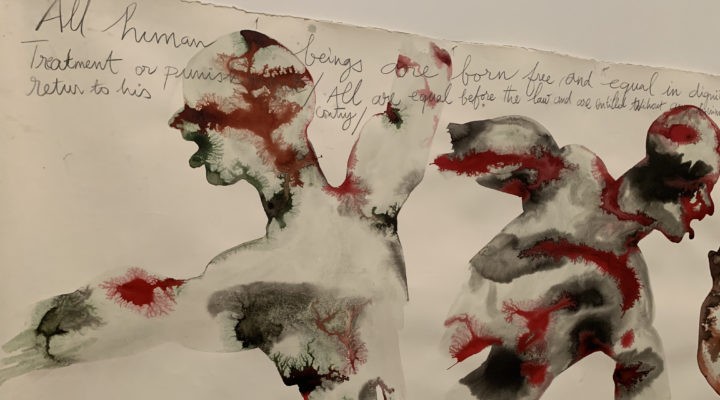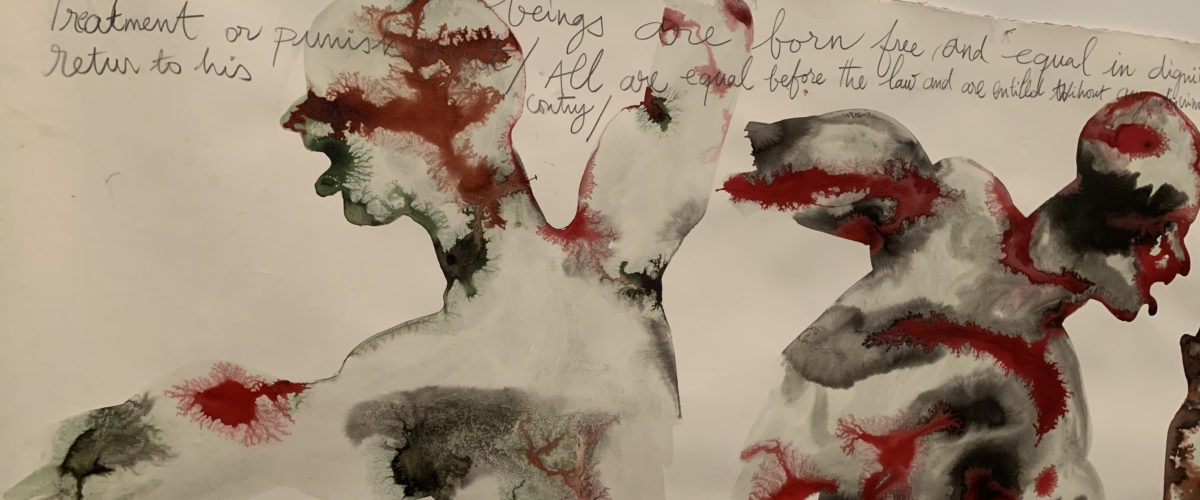The videos don’t lie, and we can’t turn away from the images of George Floyd gasping for breath, from the truth of his story and so many like it. So over the past few months as demonstrators have taken to the streets and millions more have grappled with the recognition that we live in a racist society, I have been asked by pastors, priests and primarily white congregations what they should do now.
 In The Color of Compromise, Jemar Tisby’s fine short history of racism in the American church, Tisby writes that for newly awakened white people, the path ahead can be summed up in the acronym ARC: Awareness, Relationships, Commitment.
In The Color of Compromise, Jemar Tisby’s fine short history of racism in the American church, Tisby writes that for newly awakened white people, the path ahead can be summed up in the acronym ARC: Awareness, Relationships, Commitment.
One problem with Awareness is that, as Dr. King said 50 years ago, 11:00 a.m. on Sunday continues to be the most-segregated hour of the week. What I have heard from many white people — a truth for many white congregations as well — is: “I don’t know any Black people. How can I learn about Black lives?”
Thankfully, there are a multitude of ways to learn more about racism in American culture. Awareness is as close as a great book, film or documentary about the Black experience, and you could read or watch one, preach or teach from one, or discuss one (or more!) together as a community of faith.
If I had to start with one text, it would be The Fire Next Time by James Baldwin, a fierce and loving critic of the church and of our nation. His essay expresses with intelligence and passion the conviction that while white people may have intended Black people to wither and die in ghettos, we remain inextricably bound together. You could read Maya Angelou’s I Know Why the Caged Bird Sings, a lyrical memoir about the pains and joys of growing up Black and female. You could read Bryan Stevenson’s Just Mercy, which tells a young lawyer’s story of trying to rescue wrongly convicted people of color who are thrown away by our system of justice. Memoirs by people of color take you into individual Black lives and help you understand their experiences.
“If I had to start with one text, it would be The Fire Next Time by James Baldwin, a fierce and loving critic of the church and of our nation.”
To supplement real-life stories, consider reading great Black novels to learn about the trials of their characters and more about your own humanity. Baldwin’s Go Tell It on the Mountain is indelibly set in Harlem, but any readers who grew up in a conservative church culture will recognize themselves in the story. Toni Morrison’s Beloved is a haunted and haunting story about slavery and freedom and how people hold onto their humanity in even the most horrible of circumstances. And I’d suggest Ernest Gaines’ A Lesson before Dying. This short novel shows how two men nobody expects to be heroes rise above the chains, real and metaphorical, that bind them. In great novels — and films — from Black storytellers, we are emotionally connected to characters and can experience their pain, struggles and triumphs.
White people also need to learn more about systemic racism. Besides Tisby’s book on the American church, another powerful and painful work of history is Edward E. Baptist’s The Half Has Never Been Told, which refutes many of the myths of the Noble Cause, reinforces the horrors of slavery and demonstrates that both North and South profited mightily from the cotton economy. In Michelle Alexander’s The New Jim Crow you can discover how Black people lost many of the gains granted during Reconstruction and became the real victims of the War on Crime and the War on Drugs. Richard Rothstein’s The Color of Law focuses on the legal and extra-legal ways whites segregated people of color and denied them such fundamental rights as mortgages, ready access to jobs, and good schools. All these works will lead on to other books; there is no end to learning if you and your congregation truly seek to be aware.
“Your awareness will remain abstract until you care about actual people affected by these issues.”
But Tisby points out that your awareness will remain abstract until you care about actual people affected by these issues, thus Relationship. I had read about the danger the justice system poses to Black men, but until Kelly Brown Douglas shared with me a mother’s fear for her Black son, I knew nothing. Relationship, too, is complicated by our frequent segregation, but there are ways you can enter into relationship with people outside your usual circle.
If there’s a person of color you know slightly but would like to know better, reach out in friendship. Offer a cup of coffee. Go to lunch with them. Buy them a beer. I’ve been blessed by interracial friendships that grew because I simply reached out to people I found interesting (and also probably because I didn’t approach them with the hope that they would educate me).
Institutionally, you can pursue relationship as well, although some of these activities may not be possible in our present moment. For the past four years, I’ve led or helped program conversations about race and film for congregations around the country, and they have almost all drawn diverse audiences from inside and outside the hosting churches. Any serious and loving conversation about racism, privilege and racial healing has the potential to draw together the rainbow people of God. Your white church could swap pulpits with a Black church, or schedule communal worship. You could share a meal with another congregation. And to extend the work of relationship, your congregants could join with people of color in marching for justice, working for justice and supporting the work of justice in your communities and in our nation.
It’s here, in the move toward Commitment, that we need your most potent thought. It is time to preach, teach, mourn, march, legislate, sacrifice, ask for forgiveness and search for a better way.
When you have learned about the problem and begun to repair relationships, what can you and your congregation do to help restore God’s justice within the gates? I leave that conversation where it belongs: with you.
But now, at last, praise God, I think we are ready to have it.
Greg Garrett teaches creative writing, film, literature and theology classes at Baylor University. He is the author of two dozen books of fiction, nonfiction, memoir and translation, including the critically acclaimed novels Free Bird, Cycling, Shame and The Prodigal. He is one of America’s leading voices on religion and culture. One of his most recent nonfiction books is In Conversation: Rowan Williams and Greg Garrett. His latest book, A Long, Long Way: Hollywood’s Unfinished Journey from Racism to Reconciliation, is hot off the presses. He is a seminary-trained lay preacher in the Episcopal Church. He lives in Austin with his wife, Jeanie, and their two daughters.


